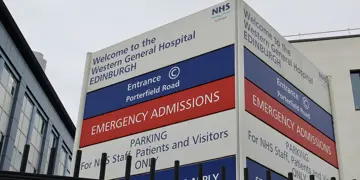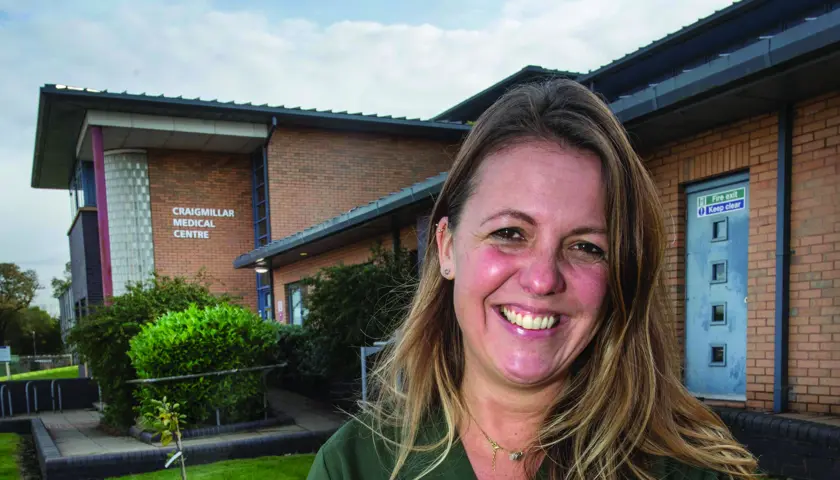Grant cuts will decimate healthcare services, warn doctors leaders
Grant cuts will decimate healthcare services, warn doctors leaders
Funding for charities and the third sector set to fall by £4.5m putting vulnerable at risk
‘Catastrophic’ cuts planned for third-sector organisations in Edinburgh will see charities close, health inequalities exacerbated, and doctors struggling to offer the care and support the most marginalised people in society need.
Those are the warnings from health professionals and local leaders following the announcement of plans to remove £4.5m of grants shared by 64 organisations across the city by the EIJB (Edinburgh Integration Joint Board), which oversees the city’s health and social care services.
The plans would see current funding, which was expected to continue at least until the end of the financial year, stopped at the end of January with the board recommended to issue a 90-day ‘notice of cancellation’ – an ‘unheard of’ in-year cut, which is an existential threat according to charity leaders.
Carey Lunan, chair of the Scottish Deep End Project which is made up of GPs working in the 100 general practices serving the most socio-economically deprived populations across the country, said GPs were ‘dismayed’ by the news.
She added: ‘The communities we care for already experience the highest levels of socio-economic disadvantage, which means that people live shorter lives, in sicker health. The services that are being cut offer support to many vulnerable and marginalised groups, across a huge range of issues impacting on people's lives, from sexual violence to mental ill-health, from carer support to welfare and debt advice.
‘There has been no consultation with general practices on how this will impact on our ability to support people in their communities. Who will our community link workers colleagues in practices have left to “link” to?’
'Catastrophic' effect
Dr Lunan said GPs recognise the ‘significant’ financial pressures facing public services across Scotland but that these decisions ‘fly in face of Scottish Government commitments to address health inequalities, to strengthen community-based support and to eradicate child poverty’.
An impact assessment carried out by the EIJB found 55,000 people received services from grant-recipient organisations during 2022/23 with a user-satisfaction rate of 91 per cent.
The board document noted that two of the EIJB’s ‘key priorities’ were to tackle inequalities and promote prevention and early intervention.
Nora Murray-Cavanagh is a GP in Wester Hailes – one of the most deprived parts of Edinburgh and works with many of the organisations affected. She said: ‘The scale of the cuts to core funding for established community providers would be devastating – with catastrophic knock-on effects for individuals, communities, and the general practices that serve these communities.’
Dr Murray-Cavanagh also raised concerns about the process – and has written to the board to suggest there is a ‘lack of realistic mitigations’, and that the impact assessment lacks detail and was not contributed to by GPs in general, let alone those working in the socio-economically deprived areas ‘where these cuts will be sorely felt’. She also raised concerns that the award-winning community link worker programme relies on these institutions and staff could be left without host employers.
She said: ‘Any GP engaged in these affected areas/population groups could attest to the critical support these community groups provide and would stress the importance of a more thoughtful, creative approach to funding.’
The EIJB board meeting, where the plans will be discussed and voted upon, is due to take place on Friday, 1 November at 10am in the Edinburgh City Chambers. Board documents recommend members approve the 90-day notice and the cancellation of a grants programme for 2025/26.
The documents also claim they will ‘adopt a more focused and evidence-based approach to prevention and early intervention’ and implement a new model of integrating third-sector representatives into planning, evaluating and decision-making processes. Doctors and charity leaders said these suggestions were ‘absurd’, and that talk of integration was cheap given there was ‘no consultation’ over the plans and this would be an ‘existential crisis’ for many organisations.
Rachel Green is director of The Ripple, a charity which supports thousands of people and works in a wide variety of areas from school workshops to meal clubs and exercise classes to activities for pensioners.
Ms Green said the charity found out about the decisions when the board documents were uploaded on Friday, 25 November – one week before the board meeting – and that there had been no consultation. She said her charity stood to lose out on an £87,000 grant, which would potentially mean having to hand the rest of its circa £500,000 budget back to funders because it would no longer be viable to continue – leaving huge amounts of people needing support from public-sector bodies instead.
She said: ‘I cannot find the words for it … How can a committee be asked to make an irrational decision? It’s a disinvestment to the area of half a million. It goes against all of the Scottish Government targets. It is cognitive dissonance between what is said and what lands at a local level. Last year I had a funding gap of £70,000 which took me nine months to fill. I cannot fill £87,000 in three months.’
Call for pause
Ms Green added: ‘This is like a sinking ship deciding it needs to be lighter and cutting off its life raft. Our prevention impact is huge … I don’t know what to say.’
Doctors and charity staff are urging local leaders to ‘take a step back’ and pause the decision – and to have a conversation about next steps.
Dr Lunan said: ‘With only 90 days’ notice being given to the affected services, we are making a plea that this decision is paused until the end of the financial year so that our colleagues, our patients, their carers and families, all have a chance to at least put some safety nets in place.’
Ms Green said: ‘Let’s take a breath together – let’s be brave enough to stop the train we are on, have a pause and get people around the table. It’s that thing, isn’t it – pressing on with a wrong decision to save face – but without criticising anybody or everybody let’s just start again.’
Dr Murray-Cavanagh added: ‘The argument that these programmes could in time, be folded into a new PSP [Public Social Partnership] model probably misses the point. Many of these micro-organisations, operating on tight budgets and already dealing with funding instability, will simply not exist by the time this current proposal runs its course. Decades of community engagement, irreplaceable relationships and goodwill – gone.
‘I implore the committee to reconsider what appears on the surface to be a “scorched-earth” approach and prioritise a funding model that engages with and bolsters, rather than dismantles, these crucial community assets.’
Necessary savings
The Doctor contacted the Scottish Government’s cabinet secretary for health and social care Neil Gray and asked whether he had any ability to intervene – among other queries for his comment – but received no response.
Pat Togher, chief officer of the Edinburgh integration joint board, said the board was required to close a £60m financial gap this year and is ‘currently preparing for similar savings’ for next financial year.
He said: ‘We must make the necessary decisions to protect our core legal duties and protect our most vulnerable – such as providing care homes, applying adult protection/ mental health legislation and preventing further drug-related deaths in the city. It is in this context that we must decide on how we now prioritise spend when faced with the gravity of the savings imposed and ensure longer term sustainability.’
Mr Togher added: ‘We have a duty to spend public money carefully and we will therefore bring forward proposals to achieve the best for the citizens of Edinburgh through working with our third-sector partners to ensure clear, measurable outcomes, which improves health and social care in Edinburgh.’




